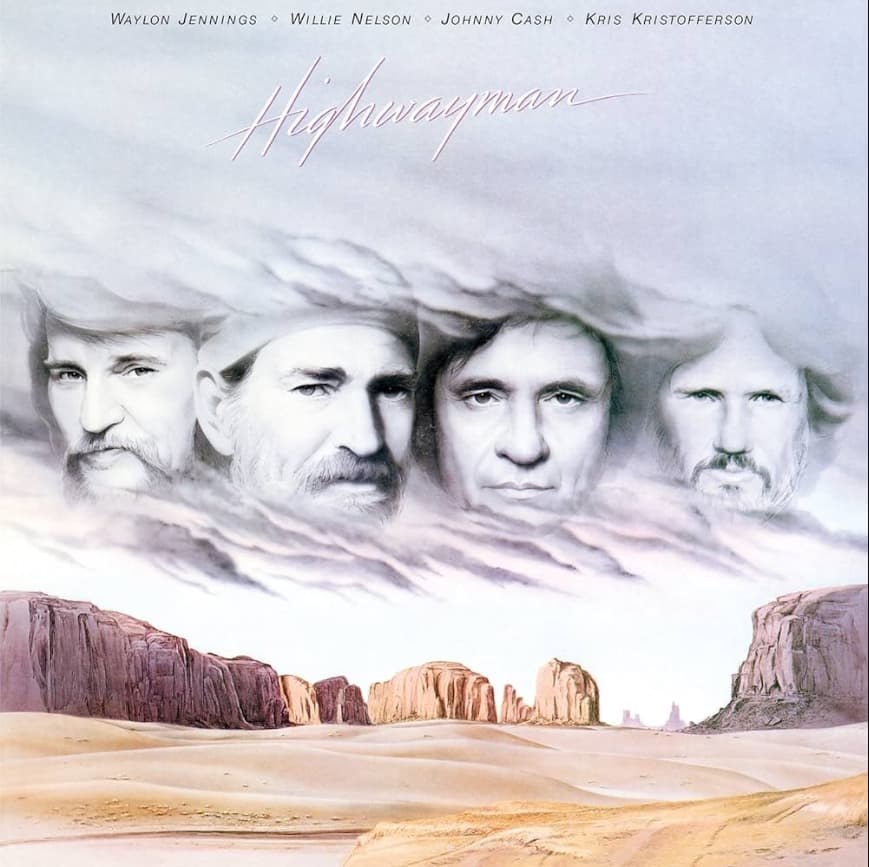
The Highwaymen – “Highwayman”: A Timeless Epic of Reincarnation and Resilience
“Highwayman” by The Highwaymen is an extraordinary song that transcends both time and genre. Released in 1985, the song became the signature track for the country supergroup The Highwaymen, which consisted of four of the greatest legends in country music—Johnny Cash, Waylon Jennings, Willie Nelson, and Kris Kristofferson. Written by Jimmy Webb, “Highwayman” is a haunting, poetic exploration of life, death, and reincarnation, told through the eyes of four different characters, each embodying a different aspect of human experience and resilience. This song not only showcases the immense vocal talent of each artist but also touches on universal themes of struggle, perseverance, and the enduring spirit of survival.
The song unfolds in four distinct verses, with each member of the group assuming the role of a different historical figure who meets an untimely end but is later reincarnated. The first verse, sung by Willie Nelson, introduces the narrator as a highwayman—a classic outlaw figure who robs coaches on the open roads. His life of crime comes to a sudden halt when he’s hanged for his deeds, but in the final lines of the verse, he hints at his rebirth: “But I am still alive.” Nelson’s delivery is both gentle and wistful, perfectly capturing the romanticized notion of the outlaw who lives on in legend even after death.
Next, Kris Kristofferson takes the reins as a sailor in the second verse. This character recounts a life spent navigating the high seas aboard a sailing ship, only to meet his fate when the ship sinks in a storm. Like the highwayman, the sailor too finds a way to transcend death: “But I am living still.” Kristofferson’s voice, rough yet tender, imbues this verse with a sense of adventure and tragedy, reflecting the dangers and allure of life on the open ocean.
In the third verse, Waylon Jennings portrays a dam builder who works on the construction of massive infrastructure projects, such as the Hoover Dam. His character dies in a tragic accident when he falls into the wet concrete and is entombed in the structure. Yet, in keeping with the theme of reincarnation, he too lives on: “But I am still around.” Jennings’ deep, resonant voice brings a rugged determination to this verse, emphasizing the hardworking spirit of the laborer who becomes part of something greater, even in death.
Finally, Johnny Cash delivers the final verse, taking on the role of a starship pilot in a futuristic scenario. This character dies while navigating the vastness of space, but his spirit persists, hinting at an eternal existence: “Perhaps I may become a highwayman again.” Cash’s rich, authoritative voice gives this verse an almost mythical quality, suggesting that the cycle of life and death is never-ending and that these characters will continue to be reborn throughout time.
What makes “Highwayman” such a powerful song is the way it weaves together these different lives, all of which end in tragedy but continue in some form through reincarnation. The song’s structure is unique, with each verse telling its own complete story while contributing to the larger narrative of survival and endurance. The recurring theme of resurrection, embodied in the line “I am still alive,” reinforces the idea that the human spirit is indomitable, capable of transcending even death.
Musically, “Highwayman” is a perfect blend of country and folk, with subtle orchestration that enhances the epic scope of the lyrics without overshadowing the voices of the four singers. The sparse arrangement—featuring acoustic guitar, gentle percussion, and atmospheric strings—creates an otherworldly mood, allowing the storytelling to take center stage. Each member of The Highwaymen brings their own distinct style and personality to the song, but together they form a cohesive unit, their voices blending seamlessly as they share the tale of these doomed yet resilient figures.
One of the most striking aspects of “Highwayman” is how it addresses timeless themes that resonate with listeners from all walks of life. The song is, at its core, about the human condition—our inevitable mortality, the desire to leave a mark on the world, and the hope that something of us will live on after we’re gone. By presenting these stories across different eras and professions, the song highlights the universal nature of these struggles, whether you’re a highway robber in the 18th century or a starship pilot in the distant future. The characters in “Highwayman” may meet tragic ends, but their spirits remain unbroken, and that’s what makes the song so inspiring.
The Highwaymen were known for their outlaw personas and their defiance of convention, and “Highwayman” is a perfect reflection of that ethos. It’s a song about living on your own terms, no matter the consequences, and finding a way to endure, even in the face of death. Each of the four legendary singers brings their own life experience to the song, and their collective wisdom gives the track a profound sense of authenticity and gravitas.
Even decades after its release, “Highwayman” remains a powerful anthem of resilience and renewal. It’s a song that reminds us of the cyclical nature of life and the enduring strength of the human spirit. Through their vivid storytelling and timeless voices, Johnny Cash, Waylon Jennings, Willie Nelson, and Kris Kristofferson have created a masterpiece that continues to resonate with generations of listeners. “Highwayman” is not just a song—it’s a poetic meditation on the essence of life itself, and a testament to the enduring legacy of The Highwaymen.